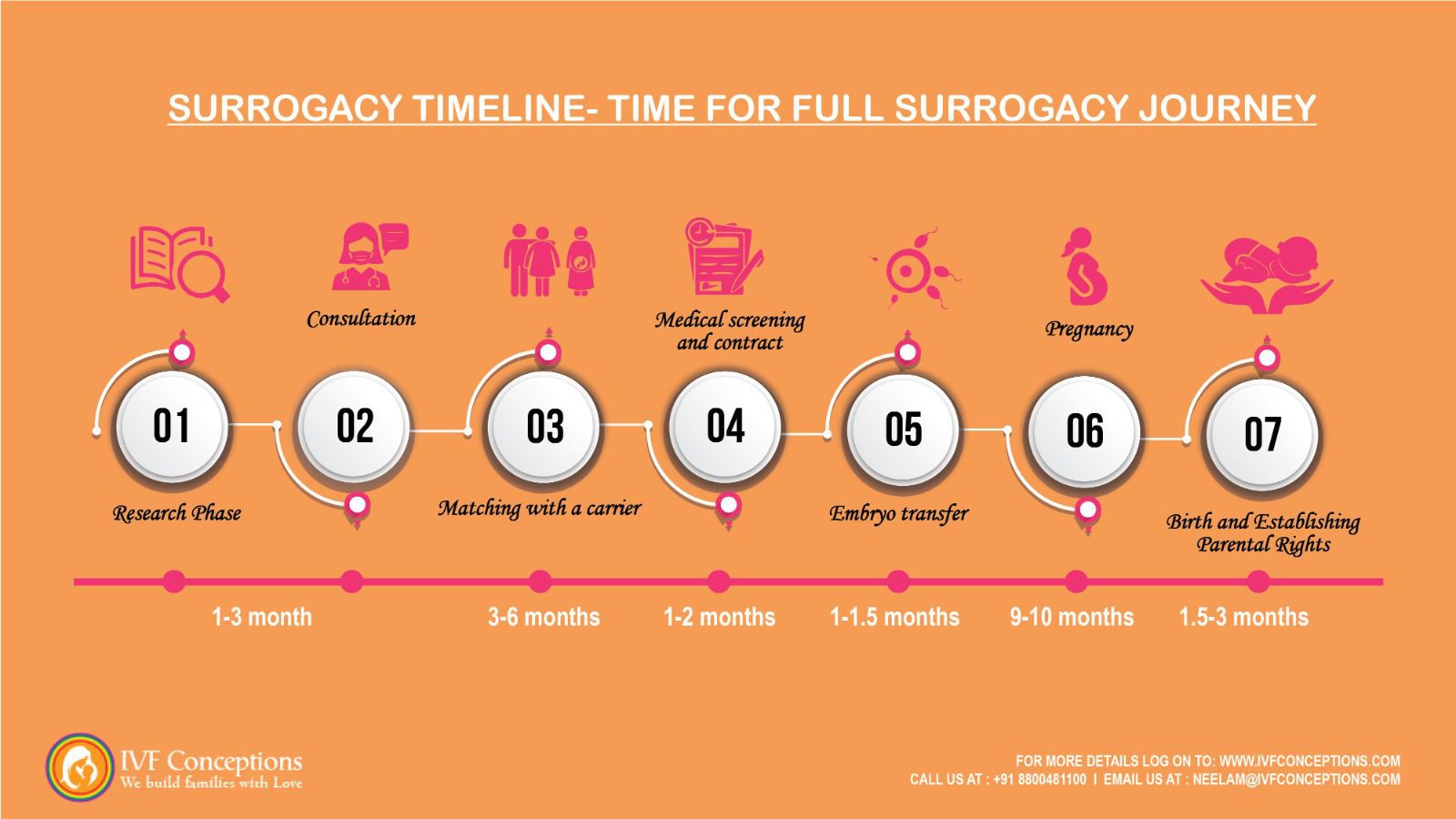Gestational Surrogacy In New Hampshire: Surrogacy process, costs, legal and agencies

If you’re thinking about gestational surrogacy in New Hampshire, you’ve made the greatest and safest decision in the country to fulfill your desire to start a family. Contrary to many other states in the US, New Hampshire has clear surrogacy rules that safeguard the parties to gestational surrogacy contracts. The state of New Hampshire has long permitted assisted reproduction, and its surrogacy rules are liberal rather than stringent.
The New Hampshire state laws were revised in 2014, making surrogacy lawful there. These new surrogacy laws in New Hampshire provided guidelines for the surrogacy process as a whole, including additional standards for persons involved in the surrogacy process as well as rules for the enforceability of surrogacy contracts.
The rights and obligations of everyone participating in this transforming journey are ensured in large part by surrogacy regulations. Like many other states, New Hampshire has unique laws protecting the interests of both intended parents and surrogates. By establishing a foundation of confidence, these laws make sure the procedure runs smoothly and morally.
Contact us directly for a free consultation!🤝
📲 +91-8800481100 ( WhatsApp, Line, Viber)
Key Highlights Of Surrogacy In New Hampshire
➔ The New Hampshire state laws were revised in 2014, making surrogacy lawful in the state.
➔ In a surrogacy in New Hampshire, the surrogate may receive basic pay for her services.
➔ In New Hampshire, traditional surrogacy is legal, but those who choose this route will be unable to get a pre-birth order establishing their parental rights.
➔ The procedure for drafting surrogacy contracts that are enforceable in court is governed by New Hampshire’s surrogacy legislation. The parties participating in surrogacy in New Hampshire must first fulfill specific standards.
➔ Regardless of the intended parents’ marital status or genetic relationship, pre-birth orders are granted across the state.
➔ In New Hampshire, second-parent adoptions are not permitted. Couples must be married in order to adopt in this state, according to a 1987 Supreme Court decision.
➔ Intended parents who employ a donor gamete in a New Hampshire surrogacy will probably still be able to get a pre-birth parentage order, regardless of marital status. Additionally, the regulations governing surrogacy in New Hampshire clearly say that “a donor shall not be the parent of a child conceived as a result of assisted reproduction and a gestational carrier agreement.”
➔ According to New Hampshire surrogacy regulations, LGBT-intended parents receive the same treatment as heteronormative intended parents.
➔ The typical cost of surrogacy in New Hampshire ranges from $100,000 to $230,000. Due to varying medical expenditures at the fertility clinic, surrogacy costs, legal charges, and other unforeseen incidentals connected with the surrogacy procedure, the cost of surrogacy varies greatly.
Additional Resources:
Everything You Need To Know (in 2024)
How Much Does Surrogacy Cost Using Family Member
Can My Insurance Provider Pay My Surrogacy Costs?
How Much Does Surrogacy Cost in the USA ( 2024)?
Surrogacy Costs Breakdown for Intended Parents
Surrogacy In Mexico-Everything Intended Parents Need To Know
Cheapest Country For Gay Surrogacy- Colombia
Low-cost surrogate mother in Argentina
Low-cost surrogate mother in Kazakhstan
An Overview Of Surrogacy In New Hampshire
 Like many other states in the US, New Hampshire has its own set of laws and procedures governing surrogacy. New Hampshire’s surrogacy regulations are comparatively progressive and provide a welcoming atmosphere for intended parents and surrogate moms.
Like many other states in the US, New Hampshire has its own set of laws and procedures governing surrogacy. New Hampshire’s surrogacy regulations are comparatively progressive and provide a welcoming atmosphere for intended parents and surrogate moms.
Although there are no surrogacy-specific statutes, the state does not forbid the practice. Surrogacy is a feasible choice for those looking to start families in New Hampshire because courts there typically uphold surrogacy agreements.
The majority of gestational surrogacy cases in New Hampshire involve the surrogate mother carrying offspring created through in vitro fertilization (IVF) utilizing the genetic material of the intending parents or donated gametes.
Less frequent and potentially more complicated legally is traditional surrogacy, in which the surrogate is genetically related to the child. The intended parents’ parental rights are frequently upheld in New Hampshire, particularly where a legitimate surrogacy agreement and pre-birth order are in place. All parties must be aware of their rights and obligations throughout the surrogacy process.
Surrogacy Laws In New Hampshire
Surrogacy laws are essential to guaranteeing the rights and obligations of all parties participating in this life-changing adventure. Like many other states, New Hampshire has special laws that protect the rights of surrogates as well as intended parents. These laws establish a basis of confidence, guaranteeing that the procedure goes off without a hitch and in an ethical manner.
Gestational surrogacy is legal in the state of New Hampshire under N.H. Rev. Stat. Ann.168-B.
Parentage Order in New Hampshire
When one or both parents are genetically linked to the surrogate child, the court in New Hampshire will always give pre-birth orders.
For intended parents considering surrogacy, proving a parental relationship is of utmost importance. Depending on the circumstances, prenatal orders or adoption procedures are frequently used in New Hampshire to establish legal parenthood.
The process can be streamlined, and post-birth legal proceedings are not necessary with a pre-birth order, which enables intended parents to be acknowledged as the child’s legal parents from the moment of the child’s birth.
Surrogacy Contract
As in other states, surrogacy contracts in New Hampshire provide a safety net for both intended parents and surrogates. To guarantee that all parties are safeguarded and completely understand their obligations, these contracts are painstakingly drafted with the assistance of surrogacy attorneys.
The surrogacy contract must, by law, contain the following:
- Consent of the surrogate to have an embryo transferred, conceive, carry, and give up the child’s custody to the intended parents
- Consent of the surrogacy contract from the surrogate’s spouse
- adoption of parental responsibilities and rights by the intending parents after the baby is born
- Any payment for the use of a surrogate and other financial details
- Possibilities for danger and each party’s obligations
- a decision on the end of pregnancy
The intended parents and their surrogates can only proceed with the surrogacy medical procedure in New Hampshire when this contract is completed and signed.
Below, we’ve provided answers to some of the most frequently asked questions about surrogacy in New Hampshire to aid you in your research.
Is paid surrogacy accepted in New Hampshire?
Yes. In a surrogacy in New Hampshire, the surrogate may receive basic pay for her services.
Does New Hampshire permit traditional surrogacy?
Yes. The intended parents who choose this route will not be able to get a pre-birth order establishing their parental rights, even if traditional surrogacy is not illegal in New Hampshire.
Are surrogacy agreements compensated or altruistically enforceable in New Hampshire?
Yes, provided that the surrogacy contract complies with all applicable New Hampshire surrogacy regulations.
What rules regarding parentage orders apply to surrogacy in New Hampshire?
Regardless of the intended parents’ marital status or genetic relationship, pre-birth orders are granted across the state. A petition for a parentage order may be filed in court before, during, or after the pregnancy; nevertheless, the majority of intended parents will opt to get a pre-birth order in a surrogacy in New Hampshire.
As long as the state’s criteria for affidavits and other legal documents are met, the procedure is quick and straightforward and doesn’t require a hearing.

How much does surrogacy cost in New Hampshire?
The typical cost of a surrogacy in New Hampshire ranges from $100,000 to $230,000. Due to varying medical expenditures at the fertility clinic, surrogacy costs, legal charges, and other unforeseen incidentals connected with the surrogacy procedure, the cost of surrogacy varies greatly.
Let’s take a closer look at a few features of New Hampshire surrogacy costs that you should be aware of.
- Surrogacy Agency Fees
A surrogacy agency has qualified staff members who offer case management, counseling, and other services. In New Hampshire, the typical cost of a surrogacy agency ranges from $20,000 to $32,000.
- Surrogacy Medical Expenses
Medication used during surrogacy increases the likelihood that an embryo transfer will be successful by helping to prepare the uterine lining for implantation. In New Hampshire, the cost of medical testing, drugs, and embryo transfer for surrogacy normally ranges from $7,800 to $14,000.
- Prenatal Care and Delivery
To guarantee the health and safety of both the unborn child and the surrogate bearing the child, as with any pregnancy, the surrogate will be examined. In New Hampshire, the average cost of the surrogate’s prenatal care and delivery is between $12,500 and $29,000.
Depending on a number of factors, such as if a C-section is being performed and any other unforeseen medical requirements for the surrogate or the child, the costs associated with the delivery of the child may vary.
- Surrogacy Lawyer Expenses
A crucial part of the surrogacy procedure, surrogate attorneys are well worth the cost because they provide you the assurance that everything is being done legally. In New Hampshire, surrogacy legal services typically cost $6,900 to $13,000.
- Surrogate Expenses
In exchange for being implanted with another person’s embryo, carrying the child to term, and then honoring their commitment to transfer the child to the expecting parent or parents, surrogates receive payment.
In New Hampshire, the base price for the surrogate is between $36,000 and $50,000.
- Surrogacy Incidental Expenses
The extra costs one could incur for things like travel, the price of insurance, and so much more are sometimes underestimated. Spend an additional $2,700 to $5,000 when planning your budget for surrogacy costs.
Depending on the specific set of circumstances, the total cost of the surrogacy procedure can vary greatly.

Surrogacy And Its Process in New Hampshire for Intended Parents
The intended parents and knowledgeable lawyers work together to draft a thorough surrogacy agreement. The rights, obligations, and expectations of each party are carefully laid out in this legally binding contract. Important topics are covered, such as compensation, medical choices, and custody arrangements.
Intended parents frequently request a pre-birth order from the court to ensure a seamless transition following childbirth. This legal document proves that they were the child’s parents before birth, making it easier to get the child’s birth certificate and lowering the risk of legal snags.
It is important for everyone involved to be aware of their rights and obligations during the surrogacy process, especially when a legitimate surrogacy agreement and pre-birth order are in place. In New Hampshire, the parental rights of intended parents are generally protected.
Gestational Surrogacy Process
- Decide on a surrogacy agency
Choose a reputable surrogacy agency with a New Hampshire address. These groups can help you identify a suitable surrogate, set up the medical and legal aspects of the procedure, and provide guidance all along the route.
- Choose a Surrogate or Become a surrogate
The surrogacy firm will assist you in your search for a surrogate who meets the relevant criteria, such as age, medical history, and previous successful pregnancies. To make sure you click, you might have the option to chat with potential surrogates.
- Legal Contracts
Legal contracts are a crucial part of the surrogacy process. Independent legal counsel will work with you and the surrogate to draft agreements outlining the conditions, rights, and responsibilities. These agreements usually cover topics including pay, medical preferences, and parental rights.
- Medical treatments
Once the legal arrangements are in place, the medical procedures can begin. For the most part, this involves in vitro fertilization (IVF), in which embryos are created using the genetic material of the intended parents or donor material. The embryos are then inserted into the surrogate’s uterus.
- Maternity care
The surrogate will receive full prenatal care throughout the entire pregnancy. The choice is yours, as the intended parents, to take part in this process and visit the doctor.
- Prenatal Order and the Birth of The Baby
In Idaho, you can apply for a post-birth order, which will enable the child’s birth certificate to include your name as soon as they are born. If you are not the child’s biological parent, this legal document establishes your parental rights and triggers the adoption process.
Finding A Gestational Surrogate In New Hampshire
 Like in many other states, finding a surrogate mother in New Hampshire entails a number of stages and factors. Legal, physiological, and emotional considerations are frequently involved in the complicated process of surrogacy.
Like in many other states, finding a surrogate mother in New Hampshire entails a number of stages and factors. Legal, physiological, and emotional considerations are frequently involved in the complicated process of surrogacy.
In New Hampshire, you can look for a surrogate mother in a few different ways:
- Surrogacy Agencies: One of the most popular methods for finding a surrogate mother is through surrogacy companies. These organizations specialize in connecting prospective surrogates with intended parents. They manage the screening, matching, and several logistical parts of the procedure.
- Fertility Clinics: In New Hampshire, get in touch with nearby fertility clinics. They may be able to provide you with suitable surrogates who have used their services, or they may have knowledge about surrogacy programs.
- Independent Matching: Some intending parents like doing their own searches for surrogates. To discover possible surrogates in this situation, you’ll need to tap into your network and online resources. To ensure a seamless and legally sound process, it is essential to collaborate with legal and medical experts.
- Advertising: You might also think about placing an ad to find a surrogate in regional newspapers, online classifieds, or on neighborhood message boards. Make sure your advertisement conforms to the rules and legislation that apply to surrogacy in New Hampshire.
Conclusion
For individuals and couples struggling with infertility, surrogacy in New Hampshire offers a viable route to parenting. For people looking to start or grow their families through surrogacy, the state is a desirable option due to its tolerant legal climate and well-established surrogacy protocols.
Consult with certified legal experts who focus on reproductive law if you are thinking about surrogacy in New Hampshire. They can help you through the procedure and make sure it’s both morally correct and satisfying emotionally.
If you’d like to learn more about IVF, Egg Donation, or surrogacy services globally, check out the rest of our website at IVF Conceptions. We offer legally secure and affordable surrogacy consulting services for FREE.
Contact us directly for a free consultation!🤝
📲 +91-8800481100 ( WhatsApp, Line, Viber)
 FAQs for New Hampshire Surrogacy| New Hampshire surrogacy laws
FAQs for New Hampshire Surrogacy| New Hampshire surrogacy laws
1. What are the laws surrounding surrogacy in New Hampshire?
New Hampshire has specific surrogacy laws that govern the legal gestational surrogacy process. It is important to consult with a surrogacy agency or legal expert to understand the legal requirements and implications of surrogacy contracts in NH.
2. How does the surrogacy process work in New Hampshire?
The process of surrogacy in New Hampshire involves medical and legal steps, including the embryo transfer and obtaining parentage orders. It is crucial for intended parents and gestational surrogates to ensure that all requirements are met for a successful surrogacy program.
3. Can same-sex couples pursue surrogacy in New Hampshire?
Same-sex couples in New Hampshire have the legal right to pursue surrogacy and seek legal advice to navigate the gestational surrogacy process and ensure their parental rights are protected.
4. Is surrogacy legal for intended parents from New Hampshire?
Intended parents from New Hampshire can pursue surrogacy, and it is essential for them to understand the legal requirements and seek information about surrogacy agreements and parentage orders to protect their legal rights.
5. What are the options for surrogacy in New Hampshire?
There are multiple options for surrogacy in New Hampshire, including gestational surrogates and the possibility of completing a surrogacy journey in the state or pursuing surrogacy programs in another state. It is crucial to discuss the available choices with a surrogacy agency.
International surrogacy guide:
Top 4 cheapest countries for surrogacy
Best Countries for Surrogacy 2024- Top International Destinations
Risks of international surrogacy
Global International Surrogacy Options
IVF Conceptions Surrogacy Prices & Plans
FAQs for surrogacy in the USA
 Q1. What is the process of surrogacy in the USA for intended parents?
Q1. What is the process of surrogacy in the USA for intended parents?
Ans. The surrogacy process in Idaho for intended parents involves multiple steps, starting with a consultation to discuss your story and questions. Working with an experienced agency Surrogacy guides through milestones like choosing an agency, finding a surrogate, medical screening, and legal contracts.
Q2. How much does surrogacy in the USA cost?
Ans. The cost of surrogacy in the USA varies depending on the program you choose. The cost of surrogacy starts at $150,000 to $200,000 based on the specific services needed and the compensation of the surrogate mother and egg donor. For low-cost surrogacy, it is advised to consider “independent surrogacy or private surrogacy”, which costs less but requires more time and management.
Q3. What are some affordable surrogacy options?
Ans. Affordable surrogacy options are:
- Opting for independent surrogacy arrangements.
- Using a surrogate mother within the family or friend circle.
- Considering the international surrogacy countries with affordable, low-cost surrogacy programs like Mexico, Colombia, Argentina, Georgia, and Ukraine.
Q4. What are the requirements for becoming a surrogate mother in the USA?
Ans. The requirements for becoming a surrogate mother are:
- To become a surrogate mother, you must meet certain criteria.
- You should have delivered a child of your own and be parenting at least one child.
- Uncomplicated pregnancies and deliveries are necessary, as documented by medical records.
- Age requirements are between 21 and 44 years old.
- The Body Mass Index (BMI) is typically no higher than 33.
- Surrogates should be citizens, legal residents, or legal immigrants of the United States.
- medically and psychologically in sound condition.
Q5. Can you help us find a low-cost surrogate mother?
Ans. Yes, we have been working in the international surrogacy domain for 13 years and have good networks of fertility clinics and surrogacy agencies globally, that are trusted to offer world-class services. We have long expertise and experience in the best and most legal international surrogacy countries.
Disclaimer:
All legal information on this website is intended only as a guide and is not a replacement for the opinions of licensed legal professionals/Medical professionals. Some information may have changed since the time of publication. We advise you to consult a licensed attorney/Medical expert with authority in fertility/surrogacy processes.

 FAQs for New Hampshire Surrogacy| New Hampshire surrogacy laws
FAQs for New Hampshire Surrogacy| New Hampshire surrogacy laws